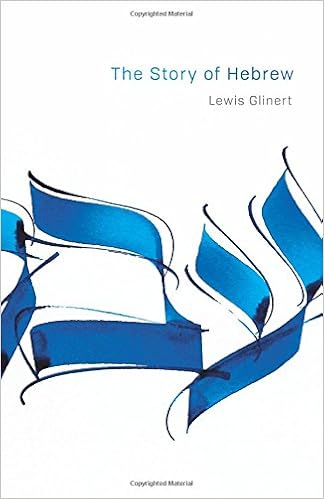There are (perhaps unsurprisingly) very few books on the history of the Hebrew language. Angel Sanez-Badillo's A History of the Hebrew Language was a seminal work in this area, but there remains little scholarship in Hebraic linguistics. But now, Lewis Gilnert's The Story of Hebrew (Princeton, 2017) fills this void and provides an accessible yet rich history of Hebrew. He probes a sweeping account of the language, from its origins in Genesis (in which he claims the first Hebrew words were spoken) to its revival in modern Israel.
This unique work of scholarship draws from the Hebrew Bible, archaeological sources (such as the Gezer Calendar and the Dead Sea Scrolls), and rabbinical texts to weave a narrative of how a tongue has shaped those who spoke it. Indeed, Hebrew is an inseparable part of Israel's heritage. For those interested in learning the fascinating history of this "living language," look no further. While some texts on linguistics are either oversimplified or too complex, Gilnert's book gracefully balances both rigor and readability. All of the Hebrew has been transliterated into English, so there is no need for learning Hebrew letters to learn about the language. It combines linguistics, history, sociology, and religious studies to create a truly magnificent and captivating testimony of a language. While this book may be written from a Israeli/Zionist perspective, it has little political charge and would be a welcome addition to the library of Jewish, Christian, and non-religious learners alike.
(My thanks is given to Princeton for providing a complimentary review copy in exchange for an honest review.)
From Aleph to Tav
Yet this book is more than a dry history of one language; rather, it examines the significance of the language to the people who spoke it. Gilnert, a respected Jewish scholar, traces its usage in Judaism and Christianity, how it served as a scholarly language in the Middle Ages, and how it was preserved carefully only to be revived by Zionists in the modern age. He explains how Hebrew was used in ancient prayer, and how it connects to modern worship.This unique work of scholarship draws from the Hebrew Bible, archaeological sources (such as the Gezer Calendar and the Dead Sea Scrolls), and rabbinical texts to weave a narrative of how a tongue has shaped those who spoke it. Indeed, Hebrew is an inseparable part of Israel's heritage. For those interested in learning the fascinating history of this "living language," look no further. While some texts on linguistics are either oversimplified or too complex, Gilnert's book gracefully balances both rigor and readability. All of the Hebrew has been transliterated into English, so there is no need for learning Hebrew letters to learn about the language. It combines linguistics, history, sociology, and religious studies to create a truly magnificent and captivating testimony of a language. While this book may be written from a Israeli/Zionist perspective, it has little political charge and would be a welcome addition to the library of Jewish, Christian, and non-religious learners alike.
(My thanks is given to Princeton for providing a complimentary review copy in exchange for an honest review.)

Comments
Post a Comment